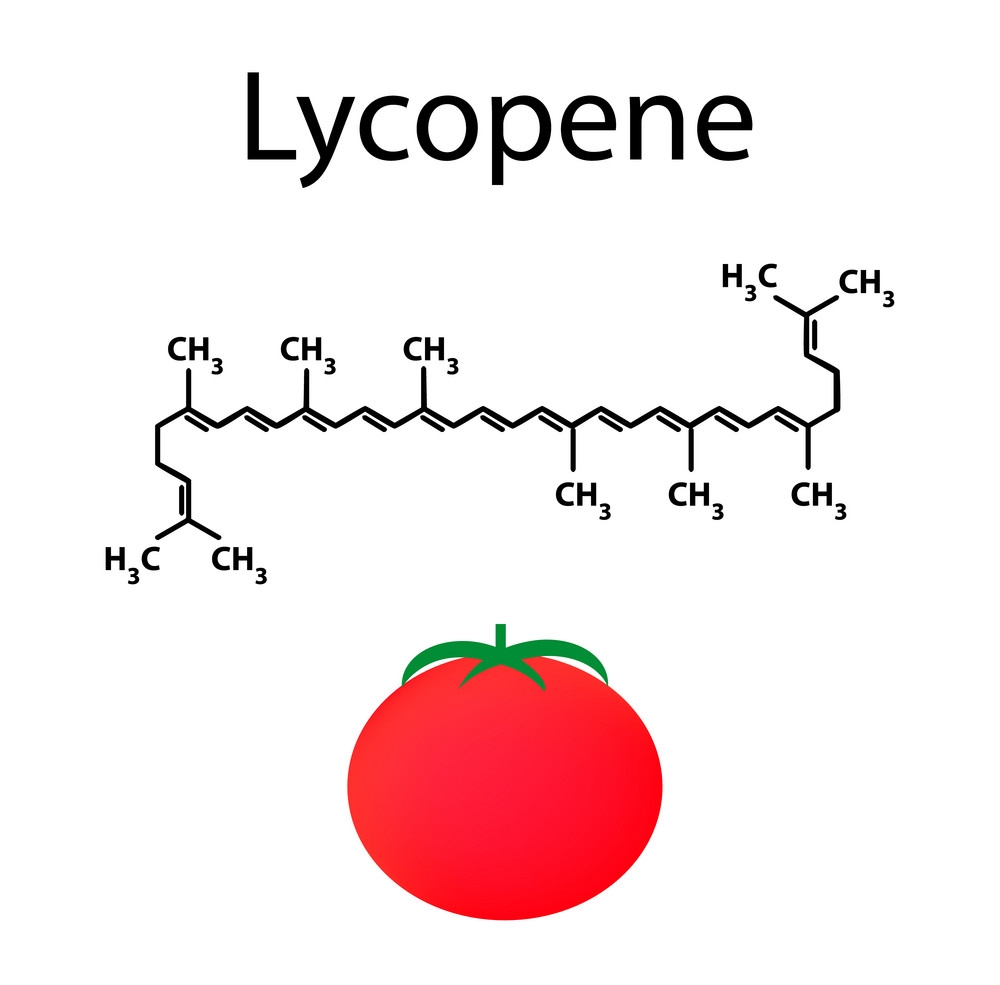



The standardized tomato products contain six times more lycopene compared to the same quantity of fresh tomatoes. Especially in the case of high quality products, meaning open-air cultures, selected fruits and adequate pasteurization.
Lycopene belongs to the family of antioxidants and is naturally found in tomatoes, strawberries, watermelons and other red fruits or vegetables. In recent years, antioxidants have proven to be very beneficial for the human body.
Lycopene is a very powerful anti-oxidant with anticancer properties. It is twice as strong as b-carotene (provitamin A). Thanks to its antioxidant action it neutralizes the free radicals of the oxygen produced by normal cell metabolism. The free radicals of oxygen can cause DNA damage that can, in turn, cause cancer.
Eating tomatoes reduces the risk of cancer of the lungs, the prostate and the stomach, and it can also lower risk of cancer of the breast, the cervix, the intestine and the rectum, the oesophagus, the oral cavity and the pancreas.
Lycopene, if given alone as medicinal substance does not have these properties. It has to be consumed naturally through food to have anticancer effect. This demonstrates that lycopene is part of a wider family of plant-based nutrients that work together to produce beneficial anticancer effects.
Tomato is rich in lycopene, thus protecting the body from effects of aging and cardiovascular diseases. Moreover, it enhances the body’s defenses and offers protection against serious diseases such as prostate cancer. Specifically, cooked tomatoes contain more lycopene that raw tomatoes, thus providing greater protection to the body.


It is a rich source of vitamins C and A, necessary for enhancing the body’s defenses, protecting it against viruses. The latest research on lycopene has shown that it has a positive effect on the immune system. According to one study, women who ate tomato paste daily for twenty days, had higher levels of lycopene in their blood than those following a tomato-free diet that did not include tomatoes. The white blood cells of the women who ate tomatoes were more resistant to oxidative damage by 33 to 42%.
Tomato is very low in calories and is one of the more suitable fruits for weight-loss.
Moisture | g/100 g | 93,7 |
Ash | g/100 g | 0,87 |
(Proteins) * | g/100 g | 1,1 |
Fat | g/100 g | N.D. |
Fat on Dry | g/100g | 1,7 |
Dietary Fibers | g/100 g | 1,1 |
Carbohydrates | g/100 g | 3,1 |
Energy | Kcal/100 g | 20 |
Energy | Kj/100 g | 83 |
Total Sugars | g/100 g | 3.1 |
Na | mg/Kg | 2175 |
NaCl | % | 0,55 |
Vegan / gluten free / diary free
Antioxidants are an essential part of a healthy diet. Tomato contains a lot of vitamin C that strengthens the body’s defenses. Two thirds of our daily needs for vitamin C are covered by two medium sized tomatoes.
Physicians at the National Institute of Public Health in the Netherlands studied 14,000 adults to establish their risk factors develop chronic obstructive pulmonary diseases such as chronic bronchitis or emphysema. The Dutch study is the first of its kind to show that flavonoids (especially catechenic acid but also flavone and flavonol and the polyphenols kaempherol and quercetin) contained in the tomatoes have the same beneficial effect on lungs with tomatoes.
Tomatoes are also rich in folic acid that is essential for rebuilding and repairing the body’s cells. People who take medication, consume large quantities of alcohol or eat a lot of meat as well as pregnant women and the elderly should eat a lot of tomatoes because they have higher needs for folic acid.
This miraculous plant also contains vitamin E that boosts fertility, vitamins from the B complex group for the proper functioning of the metabolism and for a strong nervous system as well as chromium, which is precious mainly for diabetics, since it helps to manage disorders involving sugar metabolism.
Fat-soluble vitamin A is involved in the formation and maintenance of healthy skin, hair and the membrane sebum. It helps us see in the dark and is essential for the proper development of the bones, the teeth and the reproductive system.
It also contains selenium, a substance providing protection against cancer, due to its vital role for the immune system, potassium that enhances cardiac function, magnesium against stress and muscular cramps as well as iron, copper and manganese.
Necessary cookies are absolutely essential for the website to function properly. These cookies ensure basic functionalities and security features of the website, anonymously.
Functional cookies help to perform certain functionalities like sharing the content of the website on social media platforms, collect feedbacks, and other third-party features.
Performance cookies are used to understand and analyze the key performance indexes of the website which helps in delivering a better user experience for the visitors.
Analytical cookies are used to understand how visitors interact with the website. These cookies help provide information on metrics the number of visitors, bounce rate, traffic source, etc.
Advertisement cookies are used to provide visitors with relevant ads and marketing campaigns. These cookies track visitors across websites and collect information to provide customized ads.
Other uncategorized cookies are those that are being analyzed and have not been classified into a category as yet.


